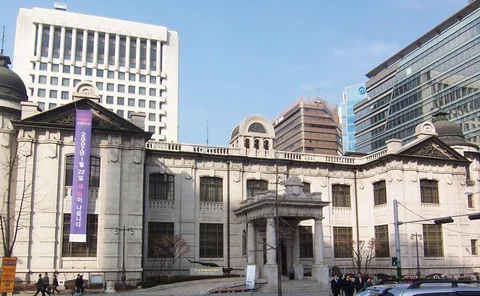Research
‘First empirical survey of European forbearance’ uses asset quality review data
Weak macroeconomic conditions, supervisory regimes and the weakness of individual banks drive the amount of forbearance on loans practised by European banks, working paper argues
Asymmetric credit growth drove pre-crisis eurozone imbalances, paper argues
Credit growth and competitiveness major causes of current account deficits, researcher says
ECB working paper links tight credit conditions to large investment cancellations
Industries most reliant on bank debt in eurozone worst hit by negative bank credit supply shocks, ECB paper finds
Threshold-based forward guidance can work at the zero lower bound, BoE paper says
Private sector industries have to understand how threshold-based forward guidance will be used in order for it to be effective, BoE working paper notes
Eurozone prices to rise in the long term, survey of forecasters says
The eurozone’s long-term inflation rate will rise, and GDP will grow ‘gradually’, professional forecasters tell ECB survey; falling energy prices expected to push short-term inflation down
Cycles in Korean unemployment explained ‘mostly’ by domestic shocks, paper finds
Working paper estimates a new Keynesian model with labour market frictions, designed to mirror the Korean economy, to study relationship between different shocks and dynamics
Macro-prudential measures may restrict financial integration, ECB paper says
Macro-prudential policies may partly explain recent fall in European and global financial integration, paper argues
‘Great moderation’ due to weaker recoveries, paper argues
The ‘great moderation’ in the US economy is still significant if analysed using a longer data set than previously, researchers argue; one of two significant falls in US volatility since 1875
Research moots greater regulation of US Treasury market
The authors discuss the potential for incentivised or mandated liquidity provision by primary dealers and the introduction of designated market-makers to counter greater instability
Eurozone monetary policy works through credit channel, paper argues
Strong evidence eurozone monetary policy works through the credit channel rather than the interest rate channel, paper says; unconventional monetary policy strongest in crisis
Models using service inflation better at predicting economic trends, Cleveland Fed paper finds
Researchers find economic forecasting accuracy improves when based on models that tie together the unemployment rate with inflation in services
No clear evidence for always using trend inflation in models, paper says
Adding positive steady-state inflation to new Keynesian DSGE models improves analysis of high-inflation periods but otherwise does not significantly alter results, paper argues
Sovereign debt holdings ‘significant’ driver of insurer risk, Bundesbank paper says
Insurance companies at risk from holdings of sovereign debt, and current regulation does not adequately deal with problem, paper argues
ECB paper explores fiscal adjustment in stressed countries
Fiscal corrections have been ‘more costly’ in contractionary times in Greece, Ireland, Portugal and Spain over the past 50 years, paper suggests
Heterogeneous beliefs may weaken effect of forward guidance, paper argues
Fixed-date and state-contingent guidance by the Federal Reserve led some market expectations to converge, but heterogeneous beliefs about inflation and consumption persisted
RBI economists attempt to pin down India’s natural rate
Researchers lend support to monetary policy by estimating natural interest rate; results imply the policy rate is now set more appropriately for tackling inflation
Turkish paper explores productivity differentials
Countries caught in middle-income trap suffered lower productivity gains than others that had ‘graduated’ from it, finds research focused on period from 1950-2005
Eurosystem’s asset purchase programme should increase growth by 1% annually, paper says
The Eurosystem’s asset purchase programme could increase growth and inflation by 1% annually for two years, a working paper from the Bank of Italy predicts
BoE paper explores money and credit at sectoral level
Working paper models sectors separately before ‘knitting’ them together; authors use framework to examine financial shock and use of quantitative easing to tackle it
Chinese slowdown could be harder than many economists think, paper argues
Chinese potential growth could be lower and its coming slowdown harder than many think; growth could slow to 5% annually by 2020, says French working paper
BIS paper offers method of overcoming time inconsistency in macro-prudential policies
Macro-prudential policies are necessary to prevent finance amplifying imbalances, but regulators struggle to credibly commit to policies, authors warn
European real effective exchange rates are hugely misaligned, paper argues
Real effective exchange rates for European Union countries do not correspond to national economic fundamentals, a working paper from the Bank of Lithuania argues
Emerging markets appear less susceptible to global contagion than advanced economies – BIS paper
Working paper explores whether central banks can still manage domestic financial conditions despite globalisation; isolates ‘contagion’ component in bond yield dynamics
Bundesbank paper explores why banks may lend too much
A limited number of banks may engage in excessive lending, and those that do are more likely to rely upon capital support, says Bundesbank paper

















